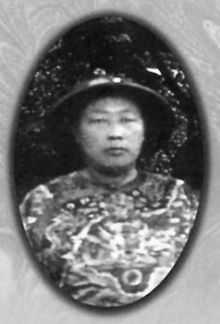An Dehai
| An Dehai | |
|---|---|
 An Dehai in an undated photograph | |
| Born | 1844 |
| Died |
12 September 1869 (aged 24 or 25) Jinan, Shandong Province, China |
| Nationality | Qing Empire |
| Occupation | Imperial court eunuch |
| Known for | Favorite of the Empress Dowager Cixi |
An Dehai (Chinese: 安德海; pinyin: Ān Déhǎi; Wade–Giles: An Te-hai, 1844 – 12 September 1869) was a grand eunuch at the imperial court of the Qing Dynasty. In the 1860s, he became the confidant of the Empress Dowager Cixi and was subsequently executed as part of a power struggle between the empress dowager and Prince Gong.[1] [2]
In 1869, the Empress Dowager sent him on a mission to the Imperial Textile Factory in Nanjing.[1] On this trip, he traveled on the Grand Canal with a conspicuous display of imperial authority.[1] This was an open violation of palace rules which prohibited palace eunuchs from leaving the capital city by themselves on the penalty of death in order to prevent them from gaining too much power.[2] When An Dehai and his entourage reached Shandong Province, the governor Ding Baozhen reported his behavior back to the Forbidden City.[1][2] Led by Prince Gong, who disliked An Dehai, the Grand Council ordered the execution of the eunuch.[2] The Empress Dowager Ci'an seems to have supported the decision and the empress dowager Cixi, who was supporting An Dehai, did not intervene on his behalf.[2] According to one explanation for the latter that has been put forward, she was attending a performance of Beijing opera at the time that the decision was taken and had requested not to be disturbed.[2] As a result, An Dehai and six other eunuchs in his entourage were beheaded [1] near the Ximizhi Spring in a Guandi Temple in Jinan. The other members of An Dehai's group were made slaves and sent into banishment to Heilongjiang in the far north-eastern corner of the Qing Empire.[1] An Dehai's execution was likely part of a broader power struggle between Cixi and Prince Gong.[2]
References
- ↑ 1.0 1.1 1.2 1.3 1.4 1.5 Rawski, Evelyn S. (February 5, 2001). Last Emperors: A Social History of Qing Imperial Institutions. University of California Press. p. 466. ISBN 0520228375.
- ↑ 2.0 2.1 2.2 2.3 2.4 2.5 2.6 Haw, Stephen G. (November 30, 2006). Beijing: A Concise History. Routledge Studies in the Modern History of Asia. Routledge. p. 224. ISBN 0415399068.